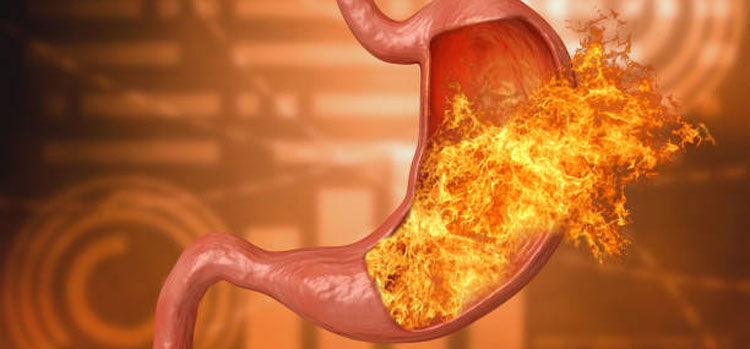
ACID PEPTIC DISEASE
Acid Peptic Disease is a digestive disorder in which the mucosal lining of the stomach, oesophagus & duodenum is damaged by excessive secretion of gastric acids & pepsin resulting in ulceration.
Most common peptic ulcers are:
- Gastric Ulcers refer to the peptic ulcers that develop in the stomach
- Duodenal Ulcers are the ulcers that occur in the upper part of small intestines known as the duodenum
Peptic Ulcer Disease is a recurrent medical condition unless treatment is aimed at preventing recurrence.
What are the symptoms?
- Burning Sensation in the stomach
- Abdominal Pain
- Heartburn
- Bloody stools
- Bloating or Feeling of fullness
- Belching
- Nausea
- Unexplained weight loss
What are the causes?
Peptic ulcers form when the acid in the digestive tract erode the inner surface of the stomach or small intestine. The excessive acid leads to formation of a painful sore the may bleed.
Some of the common causes of peptic ulcers are:
- H. Pylori Bacteria causes infection & inflammation of the inner layers of the stomach resulting in an ulcer
- Long term use of Pain Medications or Non Steroidal Anti-Inflammatory Drugs such as aspirin ibuprofen etc.
- Smoking not only causes ulcers but also enhances the risk of complications like bleeding and perforation of ulcers
How is it diagnosed?
- Physical examination to check for tenderness, pain or bloating. Your doctor may listen to the sounds of your belly
- Tests for H. pylori: The doctor may recommend blood test, stool test or breath test to look for H.pylori infection. The breath test is the most accurate and blood tests are generally the least accurate for identifying H. pylori
- Endoscopy: An endoscopy is a procedure in which a hollow tube equipped with a lens is passed down the throat, into the oesophagus, stomach & small intestine to detect an ulcer. Endoscopy is recommended only if the patient is older, has signs of bleeding, has had intentional weight loss or difficulty in eating
- Barium Swallow Test: In some cases, the patient may be asked to drink a milky liquid known as barium prior to the X Rays of the stomach. This coats the digestive tract makes the ulcers more clearly visible
What are the complications?
If untreated, ulcers can lead to the following complications:
- Internal bleeding may occur as slow blood loss or severe blood loss which may require a blood transfusion. Excessive blood loss can cause bloody vomiting or stool
- Peptic Ulcers can perforate or make a hole in the wall of the stomach or small intestine leading to infection in abdominal cavity
- Peptic ulcers can also block the passage of food through digestive tract leading to severe weight loss
How is it treated?
Treatment for acid peptic disease depends on the cause. Some of the treatment methods include:
- Use of Antibiotics: If the identified cause of peptic ulcer is H.pylori infection, the treatment would involve use of one or a combination of antibiotics
- Proton pump inhibitors are medications used to cut down acid by blocking the cells that produce acid. However, the downside of these medications is that their long term use can increase the risk of hip, wrist or spine fracture
- Acid Blockers are medications that cut down the amount of acid released into the digestive track. This reduces pain & ensures quicker healing
- Antacids help neutralise the stomach acid & provide pain relief. Antacids can help managing the symptoms and are not very useful in healing the ulcer
Refractory Ulcers
Peptic ulcers that do not heal even after treatment are known as refractory ulcers. Some of the reasons why an ulcer does not heal are:
- Skipping medications or not taking medicines as instructed by the doctor
- H. pylori may be resistant to antibiotics
- Persistent Smoking
- Long term use of pain killers
- Excessive stomach acids
- Infection other than H.pylori
- Stomach cancer
- Crohn’s Disease




